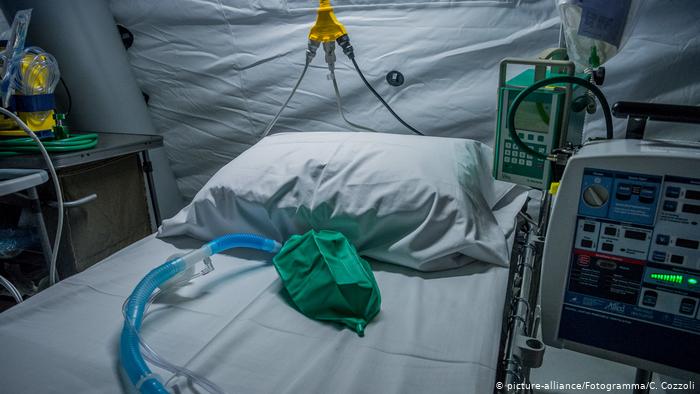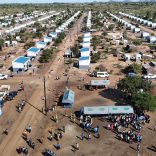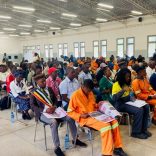Mozambique: Tzu Chi Foundation delivers more than 840 houses to cyclone victims
Covid-19 in Mozambique: “Health system has been weak for a long time”

Photo: DW
On the day that the President was about to announce a tightening of Covid-19 restrictions, DW interviewed the Chairperson of Order of Doctors of Mozambique (OMM), Dr Gilberto Manhiça. To prevent Covid, “It is necessary to maintain good practices”, Dr Manhiça warns.
According to the chairman of the Order of Doctors, Gilberto Manhiça, the Covid-19 situation in Mozambique is aggravated by weaknesses in the National Health Service which have been apparent for a long time ago.
He also stressed that the country was already under pressure, even before Covid-19, because the number of health professionals, and the doctor to patient ratio, are “below those recommended”.
Gilberto Manhiça spoke to DW Africa on the same day that the Mozambican president, Filipe Nyusi, was to announce a tightening of restrictive measures to halt the spread of Covid-19 in the country.
DW Africa: President Filipe Nyusi says the country is experiencing a “serious situation” due to Covid-19. How would you describe the current scenario?
Gilberto Manhiça (GM): We have seen a growing number of [Covid-19] cases resulting from the scenario that took place around the festivities, but the situation is aggravated by the weaknesses that were evident in the treatment of patients systems. The largest and most prevalent of them all is the National Health Service, which already had weaknesses which needed to be resolved a long time ago, something we never managed to do during all these years. Now, of course, with the addition of these [Covid-19] patients, the pressure has increased much more. It was to be expected that this would happen, and it did.
DW Africa: In your view, what should be done in the face of this pressure on health services?
GM: I think the first thing we need to ensure is that the professionals are safe. This is the priority: that those who are treating those in need of health care feel safe, so that they do not become infected during their work.
It is also necessary to take actions to encourage the workers. They were working under pressure even before Covid-19, because the number of health professionals in our country is below the recommended ratio. It is natural that they are facing greater demand and they should be properly rewarded.
The third thing, which is very important, is to realise that these numbers arise from systematic failures that we, the population in general, have been displaying in complying with the rules about washing hands, keeping our distance, and wearing masks.
We saw the result in some countries, particularly Asian ones, and if we had done the same we would probably now have the numbers we had become used to.
DW Africa: Do you think that more restrictions is the right way forward?
GM: The way forward might be more restrictions, yes, but we have to take into account that restrictions, in themselves, do not solve the problem. Countries that were successful with the restrictions, in the first wave, are today grappling with the problem even more seriously than they thought they would, given that first success. It is not enough to limit ourselves to being restrained in this way, it is very important to inculcate in the minds of all of us that we need to maintain good practices in order to defend our individual and collective life.
DW Africa: Turning to the National Health Service, what are the needs, in terms of material resources?
GM: Right now, our concern [at the Order of Doctors] is to focus on protective equipment. We asked work teams to visit health units and we found two totally opposite situations: one in which the professionals were all properly equipped and protected, and another where there was a notable lack in all sectors. We have to understand why there is a lack in some and there is not a lack in others. If we can answer this question, we can produce recommendations so that the authorities can remedy the situation. This is what we are working on right now.
DW Africa: What is the current situation in health facilities with regard to bed availability?
GM: The beds are all full right now. However, we have already envisaged the transformation of some work areas which previously accommodated other types of patients to accommodate Covid-19 patients. This health unit here in Maputo will be available at the end of next week. We hope that, with this addition, we will be able to better accommodate patients. We are talking about adding 300 intensive care beds, a few hundred in intermediate care and others for patients transitioning to leaving.
DW Africa: This, in Maputo …
GM: It is being done in Maputo [city], which is, at the moment, the epicentre of the problem. But we are also working with the provincial delegations to do the same job and we can have the spaces prepared in time and ensure that there is protection for professionals, so that we do not repeat the painful experience of Maputo.
DW Africa: Regarding vaccines, what is the current outlook for the vaccination plan?
GM: Our sources tell us that vaccines may arrive later this month from China and India and that, next month, we will be able to start vaccination – which will be focussed entirely on healthcare professionals.
DW Africa: So the recipe for combating Covid-19 includes vaccination, strengthening human resources and health facilities, and raising public awareness and restrictions.
GM: Without a doubt. I also think that, at this point in time, all the doctors in the country should be put to work. Some of them, before the start of Covid-19 and even after the start of the pandemic, had not been hired by either the public or the private system. Right now, I think it is absurd to have unemployed colleagues when the need for their work is so pressing.












Leave a Reply
Be the First to Comment!
You must be logged in to post a comment.
You must be logged in to post a comment.